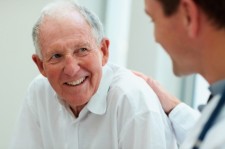Dear Readers,
Here is one of the articles you will find on my website, www.berniesiegelmd.com. From time to time, I like to highlight specific articles by themselves. My choice today is an article focusing on the importance of being an empowered patient, working with doctors who will truly partner with us on a diagnosis as we journey through the complexities of discovery, treatment, and healing which follows. Please read it with a mind open to envisioning yourself working successfully as a full partner in your health care. ~ Bernie
Beginning in 2015, The Medical College Admissions Test (MCAT), a test that is required of all applicants to medical school in the U.S. and Canada, includes a section on social and behavioral sciences and it is recommended that students take a course in psychology and sociology/anthropology to prepare for the MCAT. This is great news, as far as it goes. Since 1978, I have been talking and writing about the need to include a much broader base of human communication education to augment the science requirements. Most medical school applications have a section for the applicant to express their motivation and commitment to a medical career, but success in the science courses remains the true emphasis during the selection process.
 Even if the candidate for admission is expresses interest in and fascination with the anatomy, physiology (how the body’s systems and their component parts should work together normally in the human body, the problem is that patients—the people who come to see physicians—are generally seeing doctors who have been given medical information but not a medical education. An education teaches physicians how to deal with and care for the human experience of illness—not just treat the diagnosis from information, however excellent it is. A medical education must teach the skill of communication in every interaction with patients so that we, as physicians, do not kill with our words. Instead, we must treat sensitive and intuitive listening skills as equal to a scalpel in the healing process. Just as we regard medical equipment like scalpels and scanners, etc., as vital to successful diagnosis and treatment, we must regard the power of interpersonal communication on that same level of importance in our physician “toolkit.” Individuals are not statistics. If you are dismissive of what a patient has to tell you in depth, and tell them in an uncaring way that they must simply “face the fact that they are going to die; or be disabled for life; or any other cold analysis based on statistics, you can do irreparable harm to that patient—even to the point of taking away the will to live. One of our sons showed me how wordswordswords become swordswordswords when words are not used with sensitivity and care by physicians when they speak to patients at any point along the path of care.
Even if the candidate for admission is expresses interest in and fascination with the anatomy, physiology (how the body’s systems and their component parts should work together normally in the human body, the problem is that patients—the people who come to see physicians—are generally seeing doctors who have been given medical information but not a medical education. An education teaches physicians how to deal with and care for the human experience of illness—not just treat the diagnosis from information, however excellent it is. A medical education must teach the skill of communication in every interaction with patients so that we, as physicians, do not kill with our words. Instead, we must treat sensitive and intuitive listening skills as equal to a scalpel in the healing process. Just as we regard medical equipment like scalpels and scanners, etc., as vital to successful diagnosis and treatment, we must regard the power of interpersonal communication on that same level of importance in our physician “toolkit.” Individuals are not statistics. If you are dismissive of what a patient has to tell you in depth, and tell them in an uncaring way that they must simply “face the fact that they are going to die; or be disabled for life; or any other cold analysis based on statistics, you can do irreparable harm to that patient—even to the point of taking away the will to live. One of our sons showed me how wordswordswords become swordswordswords when words are not used with sensitivity and care by physicians when they speak to patients at any point along the path of care.
What I have found is that information does not change people. The obese, alcoholics, smokers, and nonconforming patients all know their behavior is not good for them. So why do they do it? It gets back to a lack of messages from parents, teachers, clergy, and other authority figures of love for the individual. The damage of poor parenting or traumatizing early interactions in life is just this simple and sad: Ugly ducklings rarely find out on their own that they are swans. In one study a loved child had one fourth the illness rate of an unloved child by middle age. I see pet owners with cats and dogs who have lung cancer or asthma and they go outdoors to smoke, telling me that they want to their beloved pets. For these people, killing themselves with behaviors that can be changed is not questioned. Nine hundred years ago Maimonides stated, “People would suffer fewer illnesses if they took as good care of themselves as they do their animals.” Times haven’t changed.
 I have found in patients I have seen is that approximately 20% are what I call Responsible Participants (Respants) who either already show “survival behavior,” or are interested and motivated to learn it. What I do for the other 80% of my patients is love them, give them return appointments no matter what they do, and hope that, with time and my love, some will begin to realize they are worth loving and caring for—and then they begin to care for and about themselves showing “Survival Behavior.” In a sense, they come to realize that they are swans, and that they are, indeed, divine children. In my interaction with patients, I see clearly that in this context of loving care coming from me as their physician, they are able to absorb the information that I present to them and because of that, they are also able to achieve better health as reflected on survival statistics studies.
I have found in patients I have seen is that approximately 20% are what I call Responsible Participants (Respants) who either already show “survival behavior,” or are interested and motivated to learn it. What I do for the other 80% of my patients is love them, give them return appointments no matter what they do, and hope that, with time and my love, some will begin to realize they are worth loving and caring for—and then they begin to care for and about themselves showing “Survival Behavior.” In a sense, they come to realize that they are swans, and that they are, indeed, divine children. In my interaction with patients, I see clearly that in this context of loving care coming from me as their physician, they are able to absorb the information that I present to them and because of that, they are also able to achieve better health as reflected on survival statistics studies.
As I said, I can’t sell them on the idea of being a Respant, or site better statistics that might convince them. These are people who have lost interest in working at living. They have grown up hearing that there is something wrong with them. Guilt, shame, and blame are what they are dealing with, so if you ask them to fight for their lives, it just seems to them as one more thing that they won’t get right. Sad but true. I often ask people to answer questions, join support groups, and draw pictures of themselves, their treatment, and disease. That eliminates many patients because they believe that if they are not artists they run the risk of doing it wrong; or perhaps it is because they just don’t want to work at surviving.
If I can inspire them, and breathe life into them, then changes will occur. Now they are waking up to life and what makes them happy. This is not about self-interest, but focused on paying attention to their bodies and what feels good for them to do. Monday morning we have more heart attacks, suicides, and illnesses because we feel that our lives are meaningless, with most hours of each day taken up by work we don’t want to do. I help people reclaim their lives and be reborn, so that each day, every cell in their body is given a message about the joys of life. You may ask me whether I have seen people expected to die in months cured of their disease by living this way? Yes. Do I recommend it as the sole treatment? No, because I know how hard it is to ‘live in your heart and have magic happen’ and ‘leave all your troubles to God.’
Come back next week for the next installment of Information, Inspiration, and Expiration. You’ll be glad to pick up where we left off having had a week or so to think about the message.
Peace,
Bernie

